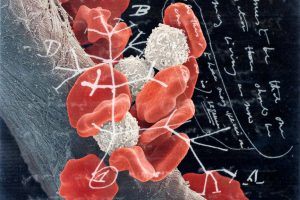Ed Yong in The Atlantic:
 In early 2014, Laura Brealey was visiting her daughters in Singapore when she slipped on a marble floor and cracked her hip. She had it replaced, but in the process, the surgeons noticed that her breathing sounded odd, and told her to speak to a respiratory specialist. At her daughtJer’s urging, she did so when she returned home to London, England—and was told that she had lung cancer. The doctors moved quickly. That same August, they cut out part of her right lung, and gave her both radiotherapy and chemotherapy. The tumor disappeared. Things were looking promising. But the following summer, Brealey started experiencing fresh pain in her ribs. The cancer was back. When I meet Brealey in April 2016, in a brightly colored room at University College Hospital, she’s about to start her third drug—a new one called nivolumab that her doctor, a young oncologist named Charlie Swanton, is hopeful about. As he preps her for the new treatment, he is also thinking about how to manage the severe pain that the tumor is causing, as it presses against the nerves that run along Brealey’s ribs. “It hasn’t been easy for Laura,” says Swanton. “When I first told her she couldn’t go back to Singapore to visit her family…”
In early 2014, Laura Brealey was visiting her daughters in Singapore when she slipped on a marble floor and cracked her hip. She had it replaced, but in the process, the surgeons noticed that her breathing sounded odd, and told her to speak to a respiratory specialist. At her daughtJer’s urging, she did so when she returned home to London, England—and was told that she had lung cancer. The doctors moved quickly. That same August, they cut out part of her right lung, and gave her both radiotherapy and chemotherapy. The tumor disappeared. Things were looking promising. But the following summer, Brealey started experiencing fresh pain in her ribs. The cancer was back. When I meet Brealey in April 2016, in a brightly colored room at University College Hospital, she’s about to start her third drug—a new one called nivolumab that her doctor, a young oncologist named Charlie Swanton, is hopeful about. As he preps her for the new treatment, he is also thinking about how to manage the severe pain that the tumor is causing, as it presses against the nerves that run along Brealey’s ribs. “It hasn’t been easy for Laura,” says Swanton. “When I first told her she couldn’t go back to Singapore to visit her family…”
“… I nearly fell off my chair in shock,” she finishes. Brealey, now 75, has bright blue eyes, short white hair, and preternaturally high spirits. “My best friend’s brother calls me the Indestructible Laura. I’m very active. Before this, I was going to the gym, doing aqua-aerobics, pilates, gardening. Now, I just sleep. This has been a nuisance.” She misses the theater, longs to return to Asia, dreams about going on the Trans-Siberian Railway. When she mentions the tumor that is curtailing all of those plans, she talks as if it was an errant child. “It’s so stubborn,” she says. Brealey’s story is typical. An initial wave of treatments seemed to knock a tumor out, but despite the scalpels, the radiation, and the drugs—not to mention relentless optimism—the tumor recurs, seemingly more resilient than before. Stubborn, as she says. Even the latest drugs, tailored to strike at the specific genetic faults behind a person’s tumor, fail to permanently halt the backswing of a tumor’s pendulum.
More here.
